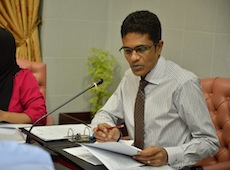Progressive Party of Maldives (PPM) MPs have decided to vote for Criminal Court Judge Muhthaz Muhsin as the new Prosecutor General (PG) despite the party’s leader, former President Maumoon Abdul Gayoom, urging ruling party MPs to vote for his nephew Maumoon Hameed.
Majority Leader MP Ahmed Nihan told Minivan News today that 33 out of 38 MPs present at a parliamentary group meeting this afternoon voted in favour of Muhthaz.
Nihan – parliamentary group leader of the PPM – also confirmed that a three-line whip has been issued for all 43 PPM MPs to vote for Muhthaz’s approval to the vacant PG post.
The decision comes after PPM Leader Gayoom sent a letter yesterday – subsequently leaked on social media – appealing for the party’s MPs to vote for Maumoon Hameed, son of former Atolls Minister Abdulla Hameed.
Gayoom noted that President Abdulla Yameen had declared at a PPM rally that he wished to appoint Maumoon Hameed to the post and that the president had “sent a message through the PPM’s official viber group” requesting the party’s MPs to vote for the lawyer.
Vetting process
Following a vetting process, parliament’s independent institutions oversight committee had rejected both of President Yameen’s nominees last week.
While a minimum score of 75 marks was required for the committee to recommend a nominee for approval, Hameed received 33 percent and Muhthaz received 67 percent.
The committee’s evaluation report has been tabled in the agenda for debate at Monday’s sitting of parliament, after which the nominees will be put to a vote.
Meanwhile, Gayoom sent a letter to MP Nihan – also leaked on social media (page one and two) – last week demanding an explanation of the PPM-majority committee’s decision.
The oversight committee – chaired by PPM MP Ali Saleem – is comprised of five PPM members, one MP from coalition partner Maldivian Development Alliance (MDA), three opposition Maldivian Democratic Party (MDP) MPs and two Jumhooree Party (JP) MPs.
In his letter, Gayoom contended that a committee meeting held on July 10 where the nominees were interviewed – where the chair had “acted arbitrarily” – was conducted in violation of parliamentary rules of procedure.
Gayoom said he had learned that the nominees were summoned without a vote by members and that an assessment criteria had not been passed prior to the interviews.
Moreover, he added, the marks sheets were not tallied in the presence of committee members.
Gayoom also argued that a sitting judge could not stand for the post of PG, citing article 151 of the constitution – which requires judges to “devote his full time to the performance of the responsibilities of a judge” – and a “legal norm” whereby judges who leave the bench must wait two years before practicing law.
While article 26(a) of the Judges Act stipulates that a judge who stands for a political post specified in law or the constitution would no longer be a judge, Gayoom noted that Muhthaz had not done so.
However, the Judicial Service Commission (JSC) has since said that judges could apply for posts in independent institutions.
Vacant PG post
Meanwhile, following the PPM parliamentary group’s decision today, MDP MP Rozaina Adam tweeted, “Could President Yameen publicly humiliate President Gayoom more than this? Yameen’s choice is very clear.”
She also alleged that Yameen had conspired for the previous parliament to reject Maumoon Hameed in April by ensuring that several PPM MPs would be absent for the vote.
Several pro-government MPs – including PG Leader Nihan who was with President Yameen in Japan and MDA Leader Ahmed Siyam – were conspicuously absent at the sitting, which saw Hameed fail to garner the required 39 votes after falling just three votes short.
According to article 221 of the constitution, “The President shall appoint as Prosecutor General a person approved by a majority of the total membership of the People’s Majlis from the names submitted to the People’s Majlis as provided for in law.”
A majority in the 18th Majlis is 43 seats. In addition to its 43 MPs, the PPM’s coalition partner MDA has five MPs. The minority party announced today that its MPs would also vote for Muhthaz.
Following the previous parliament’s rejection of Hameed, President Yameen refused to submit a new nominee and opened up a third call for applicants, announcing his intention to nominate Hameed for a second time to the newly elected 18th People’s Majlis.
The PG’s post has been vacant since November 25 following the resignation of Ahmed Muiz ahead of a scheduled no-confidence motion in parliament.
Meanwhile, Acting PG Hussein Shameem’s resignation in early May brought the criminal justice system to a halt after state prosecutors went on strike, citing concerns of a lack of accountability in the absence of a PG.
However, the Supreme Court ordered prosecutors to resume work “without any further excuse” and ordered the seniormost official at the PG office to assume the PG’s responsibilities.
 (0)Dislikes
(0)Dislikes (0)
(0)
